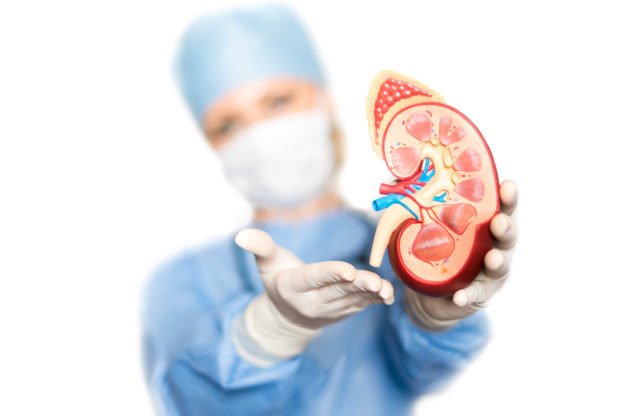By David Blyweiss, M.D., Advanced Natural Wellness
March 20, 2017
- Are antacids destroying your health?
- Why you may need more stomach acid, not less
- Diagnosing the source of your digestive issues
When people come to me with chronic indigestion, the first thing I ask is what they’re currently doing to relieve their symptoms.
If I learn they’re taking a class of antacids called proton-pump inhibitors, or PPIs, I immediately advise to begin weaning off of them. It’s important to come down slowly since the longer you’re dosing with them the more proton pumps the body is making and the larger the rebound acid effect will be if you just go off cold turkey.
The reason is simple. This class of drugs comes with serious health dangers that their manufacturers would much rather you didn’t know about.
PPIs increase your chance of a heart attack by about 20%. They weaken your bones, which puts you at increased risk of a hip or spinal fracture. These drugs increase your risk of dementia, deplete your levels of vitamin B12 and magnesium and leave you open to deadly antibiotic resistant infections like clostridium difficile.
But it doesn’t stop there.
They can also lead to long-term kidney damage – without any warning signs at all. In fact, more than half of people on PPIs who develop chronic kidney disease or end stage renal disease have never had kidney problems before in their lives!
MD Exposes the Hidden Danger to Your Eyes

When your eyesight starts to fail, it's a real problem. Suddenly you can't go to the grocery store... you can't get to the doctor if you have an emergency... you can't meet your friends for dinner…
Your "regular" doctor doesn't have time to keep up with the latest research. And the same goes for eye doctors. They go to school to learn how to fit you for glasses and contacts, but have no way of preventing the damage and loss of eyesight that threatens your freedom and independence.
Let me show you something that explains a LOT about how your eyes work.
In my FREE Special Report, I'll show you a HUGE, untapped resource for your eyes that safely and naturally restores clear, effortless eyesight.
Click here to get started...
These are not minor risks. In fact, they can be quite deadly. Worst of all, these drugs may not even be treating the real problem behind your digestive issues.
You may need more Stomach Acid, not Less
The television is riddled with commercials for Nexium, Prilosec, Prevacid and Zegerid. And the message is clear: Taking these drugs will reduce stomach acid and cure whatever digestive upset is ailing you.
Once upon a time, most of these were only available by prescription. But nowadays you can pick them up right off the drugstore shelves. You don’t even have to have a diagnosis that tells you what your real health issue might be.
But just because you frequently have acid reflux or heartburn, it doesn’t mean you’re producing too much stomach acid.
Here in my own practice I find that it’s just the opposite. More often than not, people with digestive issues are suffering from too little stomach acid, not too much.
In fact, at least half of patients with heartburn—especially those over age 60—don’t have enough stomach acid to start with. Yet they’re popping PPIs like candy. This, of course, depletes stomach acid and digestive enzymes even further.
This is a big problem, since low stomach acid throws off symptoms that are remarkably similar to too much acid, such as gas, indigestion, bile reflux, constipation and so on.
The World's Quickest Solution for Ending Prostate and Urinary Misery
This has recently been revealed to be one of the only real breakthroughs in prostate health.
The seeds of a strange fruit (sometimes called "Chinese Apples") hold powerful phytonutrients that are a revolution in prostate health.
In fact, UCLA and Veterans Administration research have now proved this to be true.
Not only that, but it may be the worlds quickest solution for ending prostate misery.
Simply stated, these phytonutrients represent a huge step beyond beta sitosterol, saw palmetto, and other phytosterols alone.
Simply click HERE if you want to have fast prostate relief...restful, uninterrupted sleep...no more constant "urges to go"...enhanced virility...and optimal prostate support for life.
It also comes with its own set of problems.
Without enough stomach acid, you can’t properly absorb protein, vitamins and minerals. Additionally, it can result in small intestinal bacterial overgrowth and create a toxic environment in your gut.
Ultimately, the best treatment for digestive upset is knowing what’s causing the problem to start with… and removing or correcting it without killing yourself in the process.
At Home Test Reveals the Source of Your Digestive Issues
To find out if you really have too much stomach acid, simply take a tablespoon of apple cider vinegar in a glass of water the next time heartburn strikes.
If the pain disappears or gets remarkably better, that’s a pretty good indication that your body isn’t producing enough hydrochloric acid. There are also tests any GI specialist can do that will tell you if you’re not making enough (hypochlorhydria).
To help boost your body’s natural production of stomach acid, just take 325 to 650 mg of HCL betaine with pepsin at the beginning of each meal, depending on the size of the meal. (If you experience a slight burning sensation in the pit of your stomach, just decrease the amount next time you take it.)
You’ll also want to repair any damage caused by GERD and acid-blocking drugs.
For that, try deglycyrrhizinated licorice (DGL). It can help ease your heartburn symptoms while repairing the mucosal lining of the stomach. Simply chew two DGL tablets before eating or whenever heartburn strikes.
If you’re currently taking a PPI to reduce stomach acid, I suggest working with your doctor to find a safer remedy. Taking 500 mg of mastic gum twice a day with 75 mg of zinc carnosine for three to four weeks can help while you make the transition.
SOURCES:
Shah NH, et al. Proton Pump Inhibitor Usage and the Risk of Myocardial Infarction in the General Population. PLoS One. 2015 Jun 10;10(6):e0124653.
Yu EW, et al. Proton pump inhibitors and risk of fractures: a meta-analysis of 11 international studies. Am J Med. 2011 Jun;124(6):519-26.
Jackson MA, et, al. Proton pump inhibitors alter the composition of the gut microbiota. Gut. 2016 May;65(5):749-56.
Choudhry MN, et al. Overuse and inappropriate prescribing of proton pump inhibitors in patients with Clostridium difficile-associated disease. QJM. 2008 Jun;101(6):445-8.
Gomm W, et al. Association of Proton Pump Inhibitors With Risk of Dementia: A Pharmacoepidemiological Claims Data Analysis. JAMA Neurol. 2016 Apr;73(4):410-6.
Xie Y, et al. Long Term Kidney Outcomes among Proton Pump Inhibitors Users without Intervening Acute Kidney Injury. Kidney International. Feb. 22, 2017.
Yago MR, et al. Gastric Re-acidification with Betaine HCl in Healthy Volunteers with Rabeprazole-Induced Hypochlorhydria. Mol Pharm. Nov 4, 2013; 10(11): 4032–4037.







